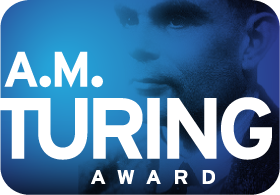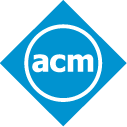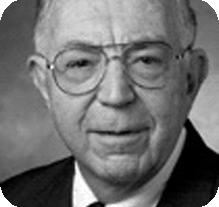
A.M. TURING AWARD WINNERS BY...
Edward A ("Ed") Feigenbaum

United States – 1994
Short Annotated Bibliography
Books and Monographs
- Feigenbaum, A. E. and Julian Feldman (editors), Computers and Thought, McGraw-Hill, 1963, reprinted by AAAI Press/The MIT Press, 1995. Contains copies of pioneering papers and served as a valuable introduction for people who were beginning work in artificial intelligence.
- Feigenbaum, A. E., A. Barr and P. Cohen (editors), Handbook of Artificial Intelligence (Four Volumes), Wm. Kaufmann Inc., 1981-84. Contain specially commissioned and well-written summaries of important AI ideas.
- Feigenbaum, A. E. and Pamela McCorduck, The Fifth Generation: Artificial Intelligence and Japan's Computer Challenge to the World, Addison-Wesley, May 1983.
- Feigenbaum, A. E., Pamela McCorduck and H. Penny Nii, The Rise of the Expert Company: How Visionary Companies are Using Artificial Intelligence to Achieve Higher Productivity and Profits, Times Books, 1988. The above two books have had great impact on business practice and technology policy.
Important Papers
- Feigenbaum, E. A., Buchanan, B. G., Lederberg, J., “On Generality and Problem Solving: A Case Study Using the DENDRAL Program,” in Machine Intelligence 6, B. Meltzer and D. Michie (eds), Edinburgh University Press, 1971. (Also Stanford Heuristic Programming Project Memo HPP-70-5, and Computer Science Memo STAN-CS-176). This paper introduced the “knowledge-is-power” hypothesis.
- Feigenbaum, E. A. and Herbert Simon, “EPAM-like Models of Recognition Learning,” Cognitive Science, Vol. 8, Num. 4, October-December, 1984, pp. 305-336. Describes and defends pioneering simulation models in cognitive psychology.
- Feigenbaum, E. A. and B., Buchanan, “DENDRAL and Meta-DENDRAL: Roots of Knowledge Systems and Expert System Applications.” Artificial Intelligence, Vol. 59,Num. 1-2, pp. 233-240, 1993. Describes a program that discovered new knowledge about the fragmentation of ketoandrostanes in a mass spectrogram.
- Feigenbaum, E. A., “The Art of Artificial Intelligence: I. Themes and Case Studies of Knowledge Engineering,” Proceedings of the International Joint Conference on Artificial Intelligence, 1977 and the National Computer Conference 1978 (winner of the conference award for most outstanding technical paper). (Also, Stanford Heuristic Programming Project Memo HPP-77-25, and Computer Science Department Memo STAN-CS-77-621). Introduced expert system research to a wide audience.
-
Nii, H. P., E. A. Feigenbaum, J. Anton, and A. J. Rockmore, “Signal-to-Symbol Transformation: HASP/SIAP Case Study,” AI Magazine, Vol. 3, Num. 2, pp. 23-35, 1982.
- Feigenbaum, E. A., ACM Turing Award Lecture, “How the ‘What’ becomes the ‘How,’” Communications of the ACM, Vol. 39, Num. 5, 1996. Describes artificial intelligence as an extremum of the “What-to-How” spectrum. The text can be found here.
- Feigenbaum, E. A., “Toward the Library of the Future,” in Long Range Planning, Vol. 22, Num. 1, pp. (118-123, 1989. A version of this paper under the title “Autoknowledge: From File Servers to Knowledge Servers” appeared originally in MEDINFO 86, R. Salamon, B. Blum, M. Jorgensen (eds.), Holland, Elsevier, 1986. Describes the “Library of the Future” as a collection of knowledge sources communicating with each other.




























 THE A.M. TURING AWARD
THE A.M. TURING AWARD